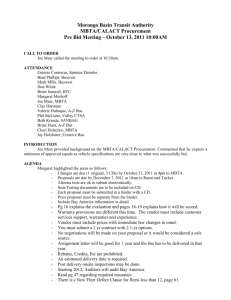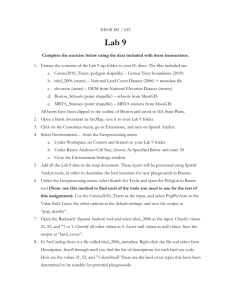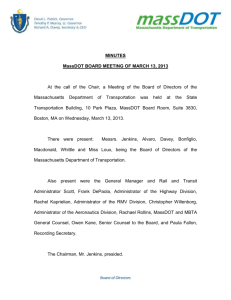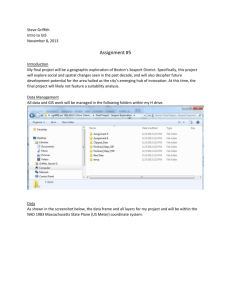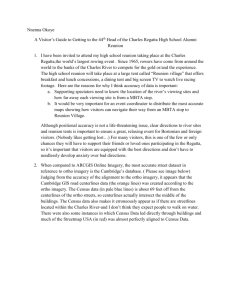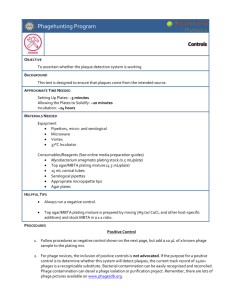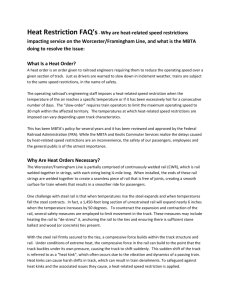Cambridge Symphony Orchestra - MBTA Rider Oversight Committee
advertisement
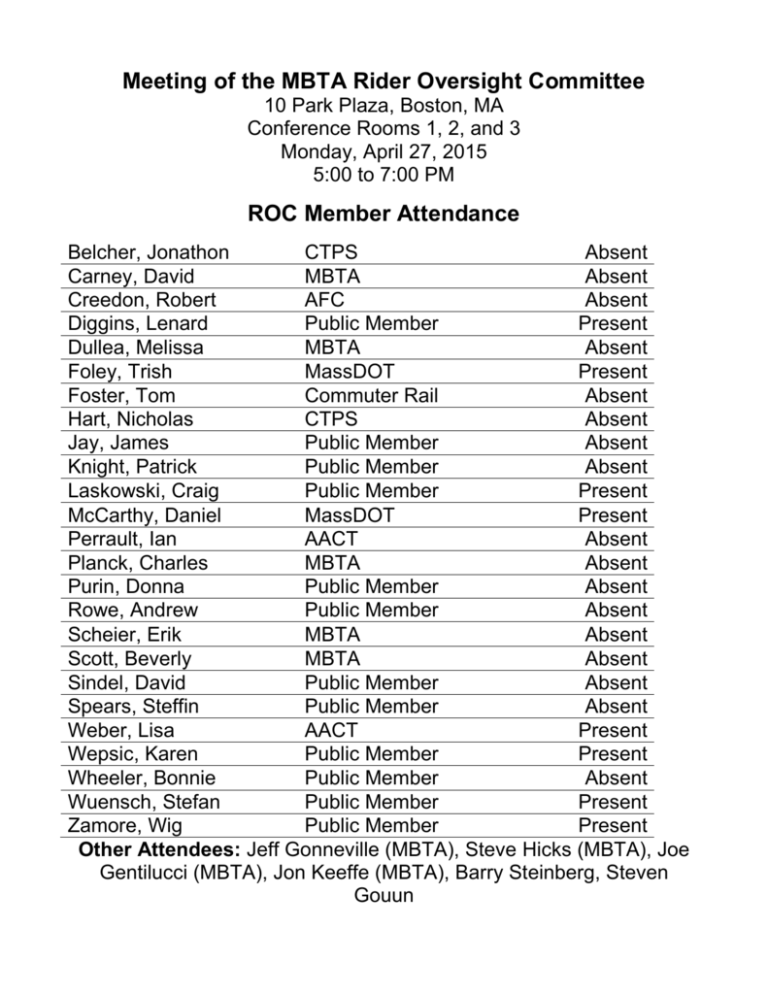
Meeting of the MBTA Rider Oversight Committee 10 Park Plaza, Boston, MA Conference Rooms 1, 2, and 3 Monday, April 27, 2015 5:00 to 7:00 PM ROC Member Attendance Belcher, Jonathon CTPS Absent Carney, David MBTA Absent Creedon, Robert AFC Absent Diggins, Lenard Public Member Present Dullea, Melissa MBTA Absent Foley, Trish MassDOT Present Foster, Tom Commuter Rail Absent Hart, Nicholas CTPS Absent Jay, James Public Member Absent Knight, Patrick Public Member Absent Laskowski, Craig Public Member Present McCarthy, Daniel MassDOT Present Perrault, Ian AACT Absent Planck, Charles MBTA Absent Purin, Donna Public Member Absent Rowe, Andrew Public Member Absent Scheier, Erik MBTA Absent Scott, Beverly MBTA Absent Sindel, David Public Member Absent Spears, Steffin Public Member Absent Weber, Lisa AACT Present Wepsic, Karen Public Member Present Wheeler, Bonnie Public Member Absent Wuensch, Stefan Public Member Present Zamore, Wig Public Member Present Other Attendees: Jeff Gonneville (MBTA), Steve Hicks (MBTA), Joe Gentilucci (MBTA), Jon Keeffe (MBTA), Barry Steinberg, Steven Gouun Agenda Call Meeting to Order: Wig Zamore at 5:05 P.M. Safety Briefing and Welcome: Trish Foley Public Comments: Karen Wepsic made a comment regarding a bus she saw emitting black smoke. ROC Introductions Members of ROC introduced themselves to the Jeff Gonneville and his staff. Jeff Gonneville, Chief Mechanical Officer Jeff Gonneville, Chief Mechanical Officer of the MBTA, was invited to the General Meeting by the Committee. Mr. Gonneville opened up his time with the Committee with general statements, specifically lessons learned from the winter and plans moving forward. He spoke to the extraordinary weather that Boston experienced and the consequent various failures experienced by the MBTA. Mr. Gonneville identified failures to the propulsion systems as the most damaging to regular service. Mr. Gonneville and his team explained the mechanical reasons for failure and the difficulties the weather and circumstance posed. Mr. Gonneville stated that the greatest number of failures was on the Orange Line, despite having what the MBTA thought was a good amount of backup traction motors going into the winter. He then explained the MBTA’s previous thinking as “more snow, more trains you run,” something that had worked in years past. 2 However, in the extreme level of snow this winter, this plan damaged trains. The MBTA recognized this and made the decision to not run trains to prevent longer-lasting damage. Mr. Gonneville stated that the newer train fleets also suffered failures. The 5 cars experienced 51 failures, while the 3 cars suffered 22 failures. CMO Gonneville affirmed that on an average day, there are 460 traction motors dedicated to the Orange Line, and during the winter, 160 of these traction motors failed. He claimed that in order to deal with these unprecedented failures, the MBTA set up emergency contacts with several businesses to repair the failed motors and resume service more quickly. Jeff Gonneville then pivoted to answer the questions posed by the Committee. In regards to increasing the number of spare traction motors, Mr. Gonneville specified that the MBTA is seeking to add roughly 60 motors to the Orange Line, 30 spare motors for the #1 and #2, 20 motors for the Red and Blue Lines, and 15 for the #3. Mr. Gonneville thanked LTK for their assistance in investigating the causes behind the MBTA failures this winter. This contractor has provided the MBTA with quality data that the Authority can enact change on. Because of this assistance, the MBTA is two months ahead of schedule on changes. LTK even developed a prototype for the Authority to help prevent some of the traction motor failures. Mr. Gonneville declared that the Authority is currently looking for funding to overhaul and repair some of the maintenance backlog. He asserted that the average life span of a rapid transit car is 2530 years, and the Authority’s trains are due for an overhaul. A public attendant asked what caused the failures in the #3 cars. Mr. Gonneville and his staff reiterated, in more technical detail, what caused the mechanical failures. They labeled the issue a “self-perpetuating problem,” with snow, moisture, overheating, and insulation. Lenard Diggens then asked if there were any 3 designs that can withstand the influx of snow and the resulting issues. Mr. Gonneville pointed to the new Red Line cars and the American Public Transportation Association (APTA) peer review. The APTA review, consisting of representatives from New York City, New Jersey, Chicago, Toronto, and others, cited the necessity for a non-revenue fleet to clear snow. Mr. Gonneville claimed that New York and Chicago had “ah ha” moments, when storms lead them to creating these fleets. The CMO declared that the Authority would further research possibly pursuing refitting older trains with new materials and/or purchase new trains. He agreed with the findings of the APTA review. Jeff Gonneville thanked New York MTA for their assistance during this winter. Craig Laskowski asked the CMO why the MBTA did not employ all of their trains, specifically the larger trains that have been decommissioned since the late 1990s. The CMO answered that he did not know why these trains were not being used, but also that his team is currently working on updating, repairing, and retrofitting these trains for the next winter. The challenge, Mr. Gonneville claims, is that, due to the age of these trains, many of the parts need to be completely stripped and replaced – a timeconsuming process. The MBTA does have the funding to revitalize these trains. The Authority also is considering purchasing new custom fitted equipment. Mr. Gonneville again asserts that the Authority learned a great deal from this winter, specifically regarding emergency construction contracts. Lenard Diggens inquired about the personnel issues of the MBTA, explicitly ensuring that employees are properly trained on not only the new equipment, but also the current equipment. Mr. Gonneville assured Mr. Diggens that the Authority will properly train all employees. Mr. Diggens then asked about the procurement process and how the Authority’s process is different than the private sector. Mr. Gonneville outlined the procurement process, highlighting the complexity and intended redundancies in the system, as the MBTA is a public entity, subject to public laws and processes. To help streamline the procurement process, the 4 Authority will subcontract projects to private companies, which can be more efficient. Lisa Weber thanked Mr. Gonneville and his staff for coming and having a discussion with the Committee. Ms. Weber raised a concern over the equipment’s durability in not only winter, but also summer. She asserted that because of recent events, the citizens of Massachusetts are receptive to changes to the MBTA, including increased funding. Ms. Weber ended her statements with a declaration that drivers who disrupt service by getting stuck on tracks should be ticketed. Mr. Gonneville responded to Ms. Weber’s comments. He shared her concerns for the equipment’s durability in the heat of summer, but assured the Committee that the Governor and his office have been constantly in contact with himself and the MBTA. While focused on winter recovery, Mr. Gonneville, his staff, and the Governor’s office have been planning for the summer challenges. The Authority has sought out contacts to develop new A/C units and repair old units, along with other measures to ensure a successful summer. Karen Wepsic aired her concerns over the Mattapan Trolley Replacement Plan. Mr. Gonneville informed Ms. Wepsic and the Committee that he and the Interim GM Frank DePaola have spoken about this issue on numerous occasions. It is the opinion of Mr. Gonneville that the Mattapan trolleys have gone beyond their usefulness and belong in a museum. The MBTA has contracted a civil engineering firm to evaluate the Mattapan Line and different options moving forward. Lenard Diggens questioned the current snow policies of the MBTA, arguing that it could be more effective to lower service in times of extreme weather, rather than maintaining regular levels. Mr. Gonneville declared that the snow policies and standard operating procedures of the MBTA will have to change, and in fact, they are currently developing a new 2015-2016 winter plan. 5 The CMO believes that this plan will contain a reduced service plan as a way to protect trains. He also stated that change is difficult for the MBTA, and that any plan will be continually evolving based on available equipment. The changes will also reflect some of the recommendations and findings from the APTA review, such as reduced service and storm drains in tunnels. Mr. Gonneville hopes to enact “full scale drills” to prepare T employees and the system for emergency scenarios. Wig Zamore asked Mr. Gonneville if he was willing to extend his time with the Committee, as the original 45 minutes of discussion had already gone by, for an additional 10 minutes. Mr. Gonneville and his staff agreed. Mr. Gonneville announced that he wished to discuss anti-icing, as he has heard numerous questions about its use and misinformation in the media and public. He dismissed the declarations of anti-icing as the “ultimate solution.” The CMO admitted that the Authority has not typically used anti-icing in the past, but employed it this winter. Usually, the T runs “sleet scrapers” to clear off the ice buildup, which has worked previously, and which Mr. Gonneville believes is more effective than anti-icing. He pointed to the Toronto system, which all of their trains are outfitted with a delivery system of these deicing chemicals. Lisa Weber suggested the MBTA develop a shuttle bus service plan in which shuttle buses will replace train service during extreme weather events. Ms. Weber also suggested that school buses could be employed during times of necessity, as the schools benefit greatly from the T. Mr. Gonneville responded that usually, the MBTA handles all shuttle buses, but due to the severity of this winter, the MBTA contracted outside help from Peter Pan, Yankee, and other bus companies. Stefen Wuensch inquired about the DMU procurement process. Mr. Gonneville clarified that it went out to bid on December 31, 6 2014 and it is still out to bid right now, with proposals due on August 13, 2015. Mr. Gonneville identified an expected November/December 2015 timeframe. Mr. Wuensch then asked if there was any way of monitoring the data of temperature fluctuations. The CMO acknowledged that this has been an issue that the MBTA has been working on for over a year and a half. It is still something that a team of engineers is still investigating, with the hardware aspect of the project completed, but the software aspect complicating the process. The MBTA has in place a “low-tech solution,” which monitors energy spikes through white carbon readings. Craig Laskowski inquired about the MBTA backlog, hoping to glean Jeff Gonneville’s perspective on the matter. Mr. Gonneville addressed the “state of good repair” backlog, claiming that it is not what the media has made it out to be. Mr. Gonneville asserted that the MBTA is known in the industry of public transit as a leader of asset management. Even still, it is difficult to measure the “state of good repair,” as it is not a concrete, finite number. The CMO admitted that the year to year questions about specific state of good repair make is difficult to prepare for the future. Mr. Diggens asked what the Committee could do for the CMO and his staff. Mr. Gonneville rejected the notions perpetuated by the media that the Authority is filled with “knuckle-draggers,” who are completely inept, and that the Authority is completely mismanaged. The CMO expressed his excitement about the new administration and all of the attention on the T. Mr. Gonneville thanked the Committee and left at 6:31 P.M. Wig Zamore asked both subcommittees to briefly summarize the notes from their meetings, as there was very little time left. 7 Marketing, Communications, and Operations Standing Committee Mr. Wuensch reviewed the highlights from the Marketing, Communications, and Operations Standing Committee meeting. He stated that the majority of the meeting was focused on the findings of the Governor’s Panel’s report. Some reactions, comments, and questions the subcommittee had regarding the report were as follows: the findings on parking and concessions were relatively positive, compared to other agencies; they had questions over the science of the report, specifically some of the comparisons were “apples to oranges.” The subcommittee also discussed the possibility of the MBTA procuring a fully electric bus fleet. Finance and Capital Committee Mr. Diggens summarized the meeting notes from the April Finance and Capital Committee meeting. The subcommittee followed up with the representatives from Uplink, hoping to connect the T and Uplink as the Authority thinks about the future. Mr. Diggens questioned the incentives of Commuter Rail operators and conductors to collect fares, as the money goes to the T, not Keolis. Mr. Diggens then discussed the new Youth Pass Program, which he saw as a positive step for the MBTA. He examined the status of the University Pass Program, but there have been no updates, although the Governor’s Panel suggested the T work with universities in the future. Manager’s Report The Committee provisionally passed the minutes, pending any emailed changes or updates from the absent members. Any changes of previous minutes are due within the week. New/Old Business 8 Wig Zamore provided the committee with an update on black carbon. Mr. Zamore identified diesel as the greatest contributor to black carbon, which he labeled as the “second worst pollutant.” The co-chair also decried the disconnect between the states and their response to black carbon, specifically Massachusetts delay in addressing this issue. A report on this issue will be released the first week of May. Craig Laskowski praised Jeff Gonneville and his staff as one of the better conversations this Committee has had. He expressed his disappointment with the attendance of the Committee, especially when they were expecting a known guest of this stature. Mr. Diggens and Mr. Laskowski cited the lack of attendance as a need to add new members. Mr. Zamore brought the Committee’s attention to an upcoming allday transportation summit in Worcester, featuring Secretary Pollack as a speaker. Public Comments Steven Gounn took the podium. Mr. Gouun disagreed with some of the points and service planning of the Governor’s Panel, Mr. Gonneville, and others. It is his opinion that there should bever be a suspension of service unless the Governor explicitly orders it. Mr. Gouun also brought the Committee’s attention to a recent lawsuit filed against Keolis. Finally, Mr. Gouun inquired about the status of the MassDOT Board’s decision on Late Night Service – the Committee answered that the Late Night Service was not eliminated, but rather reduced, ending a ½ hour earlier and going along less routes. Stefan Wuensch described his experience with the “Free Day on the T.” He noticed lower than usual crowds at peak hours, but during the off-peak times, there was something like a 4-5x increase in ridership. Karen Wepsic inquired if there were any 9 statistics on ridership available. She wondered what the data would reveal, specifically about on-time performance. Meeting Adjourned at 6:56 P.M. The MBTA urges all interested parties to attend. The meeting location is accessible to persons with disabilities. 10
